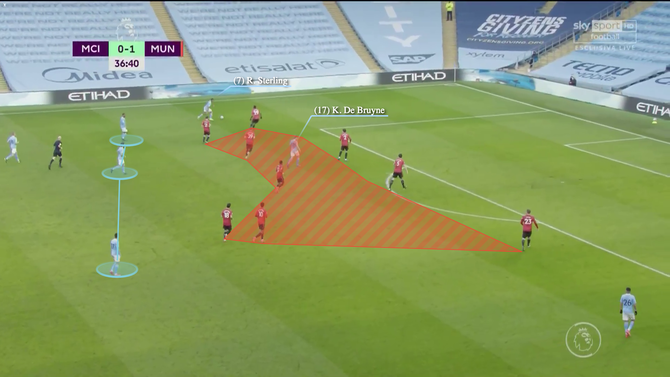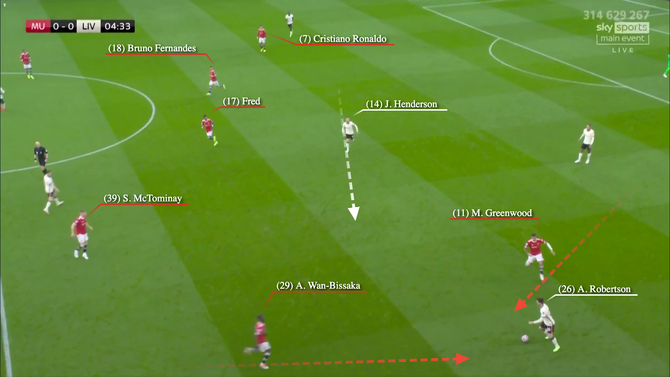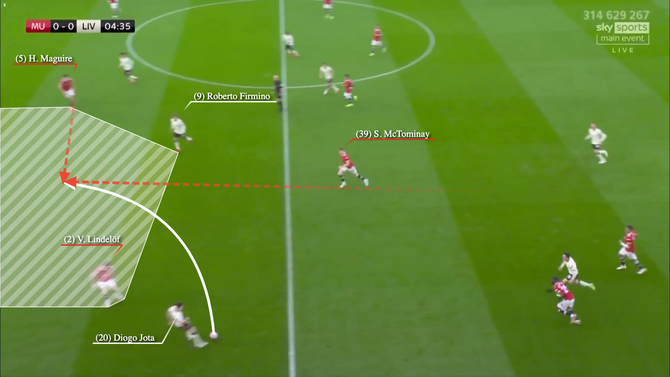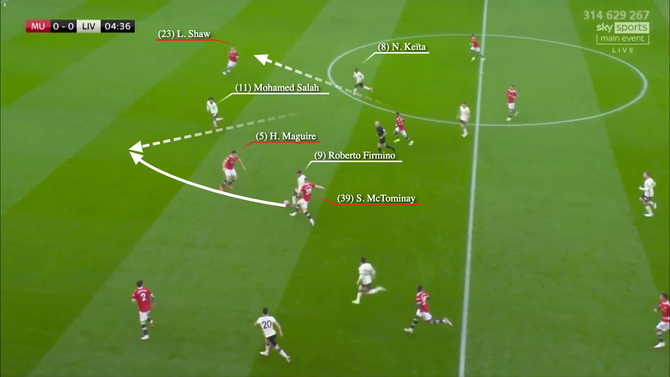
We should probably start by stating the obvious, shouldn’t we? Since Cristiano Ronaldo came back to Old Trafford, Manchester United have been woeful defensively.
The prodigal son is back, bringing with him a guarantee of goals. The issue is rather that they are flying in at both ends. It makes for drama and spectacle certainly. It is just that Sunday’s 5-0 loss to Liverpool was a bit King Lear, Act II, Ole Gunnar Solskjaer cast to the winds having been abandoned by his charges.
Correlation does not equal causation but Ronaldo’s arrival has coincided with a collapse in Manchester United’s defensive efficacy. In the 26 Premier League games between the start of 2021 and his arrival opponents had tallied shots worth a combined 26.16 expected goals (xG). Against an average opponent, in an average match, Solskjaer’s side were giving up a goal a game. Given the firepower they have at the other end that seemed inevitable.
In six league games with Ronaldo in the side Newcastle, West Ham, Aston Villa, Everton, Leicester and Liverpool have combined for 10.65 xG, 1.78 per game. Admittedly that is a number that has skyrocketed after the past two games, arguably the first two league matches this season in which anything less than a point ought to be acceptable in normal circumstances. But those defeats were hardly some aberration compared to what went before. Villa and Everton were good value for their results at Old Trafford while West Ham and arguably even Newcastle were entitled to wonder what might have been had they had a few lucky breaks on their side.
United were not a bad defensive side pre-Ronaldo. Certainly there were wobbles against the likes of Wolves and Liverpool but for the most part you got the sense that they knew exactly what they were doing, particularly against the best teams. Take their 2-0 win at Manchester City in March. There was a real plan, one of course aided by an early Bruno Fernandes penalty. They would keep the lines between midfield and defense tight, drag back the trio of attacking midfielders and suffocate any space in central areas.
Take the passage of play above. Raheem Sterling’s only real options are a line of City midfielders behind him or trying to thread the needle to Kevin De Bruyne. That move ended as so many did for Pep Guardiola’s that day, running into a red wall of defenders. City took a high volume of shots in that game but a great many of them came from outside the box or tight angles. It was a defensive performance Solskjaer could hang his hat on.
It is not as if that was an isolated game either. In December United held City to nine shots in a 0-0 draw. In the Premier League at least they were the only team to hold Pep Guardiola’s champions scoreless. They did the same against Chelsea where Solskjaer showed an ability to tailor a plan to the strengths of an opponent. Fred and Scott McTominay man marked the Blues’ inside forwards and Bruno Fernandes plugged up the opposition’s two man midfield pivot, turning the game into a stodgy, unwatchable affair. That proved to be eminently effective.
Compare and contrast that with Sunday’s performance. Again an early goal rather changed the tone of the game. Had it been Bruno Fernandes’ volley flying in at the other end moments before Naby Keita opened the scoring then perhaps United would have felt it worth dropping deep and protecting their lead. There is precious little evidence to prove or disprove this theory being as Solskjaer’s side have held the lead for just 140 Premier League minutes this season, a tally that puts them ahead of just six other teams, most of whom are hovering above the relegation zone.
Instead you had Mason Greenwood and Aaron Wan Bissaka pressing high up the Liverpool left when immediately to Andrew Robertson’s right was Jordan Henderson, completely unmarked and available for the safe pass. Fernandes had chased Liverpool back for a bit but for whatever reason did not keep up the intensity. Bizarrely Fred had joined him in chasing Liverpool back towards goal despite being 30 yards behind the play. All that did is leave a chasm where a midfield might be, as Scott McTominay looked to cover the other pass infield.
Ronaldo is there. If his team mates can magic a ball recovery he’ll be on hand to put the ball in the net, but for now the indication is very much, “you’re on your own here lads”.
Robertson doesn’t play the safe pass. The one up the line to Diogo Jota is not all that much more risky, there is space along the touchline to play it and Victor Lindelof is having to make up ground from his central defensive berth. It is only as he is flicking the pass around the corner to Roberto Firmino that Harry Maguire and McTominay seem to spot the danger.
Then Firmino need only play a straightforward through ball to Salah and Liverpool are away. Luke Shaw, meanwhile, looks like a meme in footballing form. *Record scratch* *Freeze frame* “Yup that’s me. You might be wondering how I ended up in this situation.” The world’s best forward bearing down on him with a support runner on the outside. Manchester United and Liverpool supporters don’t need telling what the end result of this move was. Eleven seconds after Alisson was resetting the visitors’ attack Naby Keita was rolling the ball into the net.
All of this came about because some Manchester United players committed to a press others were never going to join. For Liverpool, this looked like the sort of exercise they construct at Kirkby. Perhaps that is a little harsh. Those training ground dummies would at least have been arranged in an identifiable shape.
So where does Ronaldo enter this? After all, while he could perhaps have offered more at the very start of Liverpool’s move it all takes place on the opposite flank. It is not Ronaldo per se that is United’s defensive problem. Rather it is what they have had to sacrifice to accommodate him.
There is nothing stopping United playing the way they did against City, plugging gaps and sticking men behind the ball. If anything it is probably the best approach when you have a player in Ronaldo whose average ball pressures per 90 minutes look more like those of an adventurous goalkeeper than an outfielder, let alone one in a position to disrupt the opposition’s build up. According to fbref.com, United’s No.7 is carrying out 4.26 pressing actions per 90 in the Premier League this season, 41 percent fewer than in his final year with Juventus. Harry Kane, perhaps the archetypal non-pressing forward, averages 12.4.
But prior to his arrival Solskjaer had been looking to progress United into a team that defended higher up the pitch. Ten games into last season they were averaging 33.7 ball pressures in the attacking third. A rolling 10 game average saw that number drop to around 30 in early January. By the end of the season it was just short of 40. In preseason and the early games of the new campaign that trend looked to be continuing.
You would not confuse them with Atalanta or Liverpool and there was still the sense that this was a team who would win games through individual brilliance not collective excellence, but you could see the outline of a strategy developing under Solskjaer. It trickled down from the very top of the pitch. Edinson Cavani set the tone for younger players who were chasing lost causes, running hard yards. A harsh assessment of Sunday’s loss might be that Ronaldo set the tone with his pointed exasperation at every goal and his petulant stamp in the direction of Curtis Jones. Where he lead, Paul Pogba followed.
Craving even more coverage of the world’s game? Listen below and follow ¡Qué Golazo! A Daily CBS Soccer Podcast where we take you beyond the pitch and around the globe for commentary, previews, recaps and more.
Simply put, United can’t defend on the front foot if one of their number won’t do so. Ronaldo has been through enough managers who have tried to solve the conundrum of building a system that hides his defensive deficiencies. It would be fair to say that the likes of Maurizio Sarri might also be rather more tactically astute than his current boss.
Solskjaer though, gives every impression that he can do what he wants and crowbar a defensive non-entity into his side. In his program notes before the Liverpool game he made a point of praising Ronaldo for “covering so much of the pitch, tracking back and showing his work ethic” in the win over Atalanta. In that game he applied pressure to the ball on seven occasions according to fbref, while Opta tracking data says he made two clearances in his own box and regained pressure for United on one occasion. Either Solskjaer is making allowances for Ronaldo, is saying something he knows to be at best debatable, or he cannot see what is obvious to so many others.
Ronaldo, meanwhile, will not change. “I know when the team needs my help defensively,” he said before Sunday’s game. “But my role in the club is to win, help the team to win and to score goals – [the defensive side] is part of my job.
“The people who don’t want to see that is because they don’t like me but to be honest I’m 36, I win everything so am I going to be worried about the people who say bad things about me? I sleep good at night. I go to my bed with my conscience very good. Keep going with that because I will still close mouths and win things.”
They are hardly the comments of a player willing to embrace change in his own game.
There is nothing new about this conundrum here. It is par for the course at a big club. You may be attempting to build a team with an identity, that play an identifiable brand of football and one day the owners or the board will throw a bright new plaything into the mix because it’s great for engagement metrics or it plays really well for the stature of the club (or its head honchos). The best managers know that in such circumstances your plans evolve or you die. Ronaldo’s arrival has thrown Solskjaer off course. In a rational environment the manager might simply look at the extra goals he brings — some that United might have got without him — and perhaps concludes that they are not worth the sacrifices required elsewhere.
That is not an option available to Solskjaer. He either finds a way to get this defense functioning with Ronaldo or finds himself a new job. Indeed it might already be too late.





